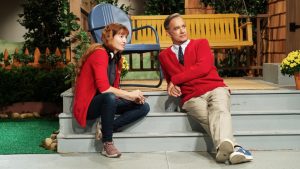Winter Park is a haven for nature lovers. In Winter Park, you’ll discover more than 70 parks, all hosts to a variety of events, gatherings and festivities throughout the year–and open to anyone looking for a place to relax in the shade and appreciate a beautiful Central Florida afternoon. Not only are there ample opportunities to hold you and your friends happy within the city limits of Winter Park, but all of Orlando’s attractions are just a few minutes away. Winter Park has a long and well-established past that circles primarily around its lakes. As the Orlando metropolitan area has grown up around Winter Park, residents have worked hard to protect the city’s natural and traditional flavor, and the outcome is a truly unique Florida experience.
For a long time, while Winter Park had a share of prosperity, no one really knew how good the Winter Park area was until the beginning of 1968. On February 19, 1968, Fred Rogers, a graduate of the Rollins University, launched his popular children’s television series, Mister Roger’s Neighborhood. Fred Rogers was the founder of Mister Rogers ‘ Neighborhood, as well as the host of all 895 episodes the composer of more than 200 songs and the puppeteer who imagined the creation of 14 characters. Most importantly he changed the face of children’s television and changed the way we think about the inner lives of young children, forever.
During his career, Fred Rogers has been a champion of children in general and PBS in particular. In 1969, he also appeared before the Senate Committee that was considering cutting public television funding Senator John Pastore was in charge of the proceedings and, despite two days of hearings he remained firm. Then Fred spoke.
“This is what I give. I give an expression of care every day to each child, to help them realize that they are unique… I feel that if we in public television can only make it clear that feelings are mentionable and manageable, we will have done a great service for mental health.”
Early career – an unlikely star
As a senior college student in music composition at Rollins University, Fred came home to see this wonderful new technology in his family’s living room. He immediately recognized the power of the new media, and particularly that it could be used to help children, rather than the slapstick and nonsense that was on the air at that time. From that point on, he understood what he was called to do.
Instead of undertaking theology studies as expected, he began his career as a TV assistant and floor manager for NBC’s music programs in New York City. Yet he soon discovered that commercial television wasn’t for him. In 1953, he came back to the area where he grew up to help found WQED in Pittsburgh, the country’s first community-supported educational television station.
Fred hadn’t set out to be the focus of a TV show. He was a private person, comfortable in the background as a co-producer, puppeteer and organist at The Children’s Corner, which broadcast on WQED from 1954 to 1962. While serving as both the program manager for the station as well as working on The Children’s Corner, he returned to his interest in theology and attended Seminary during his lunch hours. He moved to Canada in 1963, and there at the CBC, he was granted the courage to come from behind the curtain and talk directly to his young viewers as Mister Rogers.
He moved to Pittsburgh and, in 1966, introduced the current version of Mister Rogers ‘ Neighborhood. The show broadcast nationwide for the first time in 1968. Fred Rogers was married to his Rollins College sweetheart, Joanne Byrd Rogers, a concert pianist who shared his love of music. Their two sons James and John were occasional visitors to the Mister Rogers neighborhood. In 1971, Fred formed his own production company, Family Communications, to create the Mister Rogers Neighborhood, and related materials for children, families, and professionals.
Honors and Awards
Fred Rogers’ relentless commitment to all that is best in people led to an astonishing range of honors, from induction into the Television Academy’s Hall of Fame to the Presidential Medal of Freedom. He was also awarded more than forty honorary degrees.
Life is for service
Fred Rogers dedicated his life to creating television programs for the very young because he saw his potential as an instrument for good as a gift. He cared deeply for those on the other side of the screen–their wishes, their fears, their challenges, and their joys. He often said that he felt that if he offered his true self, the listener might understand it in a manner that might be beneficial. “The space between the television screen and whoever happens to be receiving it… I consider that holy ground.”
“I feel that those of us in television are chosen to be servants. It doesn’t matter what our particular job, we are chosen to help meet the deeper needs of those who watch and listen – day and night!”
A moment of silence
In 2002, Fred delivered his final opening speech at Dartmouth University. As he often did in those days, he gave an invisible gift of a minute’s silence to those who helped them to become who they were.
“Anyone who has ever been able to sustain good work has had at least one person – and often many – who have believed in him or her. We just don’t get to be competent human beings without a lot of different investments from others… From the time you were very little, you’ve had people who have smiled you into smiling, people who have talked you into talking, sung you into singing, loved you into loving.”
Fred Rogers died in 2003. He is survived by his wife of 50 years, two children, three grandchildren, and generations of viewers for whom he envisioned a better world.
A Beautiful Day in the Neighborhood

For more than thirty years, Fred Rogers, an unassuming minister, puppeteer, writer, and producer, has been beamed into American homes every day. Throughout his popular television program, Mister Rogers ‘ Neighborhood, Fred and his cast of puppets and friends spoke directly to young children about some of life’s weightiest issues, in a simple, direct fashion. There had never been anything like Mr. Rogers on television before, and there hasn’t been anything like that since then.
Although he may be best known today as a soft-spoken, cardigan-wearing children’s television host, in fact, Fred Rogers ‘ legacy is a systematic attempt to present a cohesive, beneficent perspective of how best we can talk to children regarding important issues and how media could be used as a positive force in our community.
In the upcoming film, ‘Won’t You Be My Neighbor?’, Academy Award-winning director Morgan Neville (Twenty Feet from Stardom) looks back on Fred Rogers’ influence, reflecting on his profoundly generous ideas. As the world shifted around him, Fred Rogers stood firm in his beliefs about the importance of protecting childhood. Neville pays tribute to this legacy with the latest in his collection of deeply immersive, inspiring film profiles of important American artists.
His word and works live on through the hearts of all the kids, like me, nationwide who watched Mister Rogers’s neighborhood in the mornings.
“I’d like to be remembered for being a compassionate human being who happened to be fortunate enough to be born at a time when there was a fabulous thing called television that could allow me to use all the talents that I had been given.” Fred Rogers.




